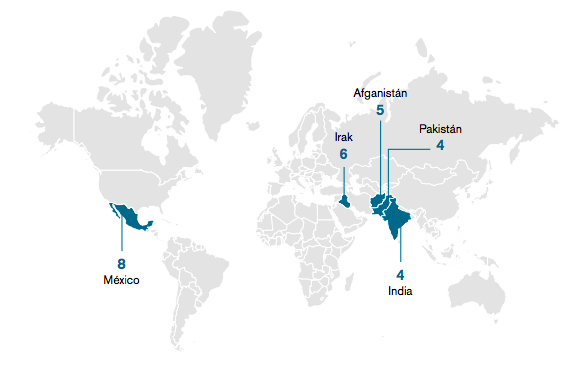According to a Reporters Without Borders report, Mexico is the deadliest country for journalists in the world, with eight reporters being murdered last year. “It is a sad constant,” the report says—in the last five years, Mexico has registered between eight and ten journalists being murdered every year.

Last year, Israel Vázquez was shot by two men in motorcycles after covering a group of dismembered people that were discovered in a church in Salamanca. María Elena Ferral was killed by eight bullets in broad daylight in Veracruz, where Julio Valdivia was also killed and beheaded only six months later. Jorge Miguel Armenta Ávalos was shot to death while leaving a restaurant in the state of Sonora. Jaime Daniel Castaño was reporting on two dead bodies abandoned on the street when he, too, was shot. Víctor Fernández was killed and dismembered in Acapulco. The hypotheses behind most killings are the stories the journalists were working on—exposing corruption and documenting organized crime. According to the State Department, 94% of crimes in Mexico are not reported or investigated. When journalists do get close to these stories, it can get them killed.
“Barbarism with total impunity,” the report reads: despite being under investigation, none of last year’s murder cases have been brought to justice. “In Mexico we are experiencing a crisis of generalized violence, human rights violations, disappearances, femicides, executions, and we are all victims. In the case of journalists, it becomes important to make it visible because when a reporter is attacked, the intention is to prevent their information from reaching me, to reach society,” said Itzia Miravete, coordinator at Article 19, an organization that defends the right of freedom of expression. “When a journalist is killed — in any region — for covering a matter of public interest, that is not only a message against the media to which he belongs but is a threat to the entire press and society. Colleagues who knew the reporter was investigating a corruption case or was behind an organized crime story hear that message and will think about it long before reporting those much-needed stories,” Pedro Vaca, special rapporteur for Inter-American Commission on Human Rights, added.
Journalists in Mexico are also targeted by laws used to silence criticism. Last year alone, 39 cases of legal harassment were committed against journalists. In the four years before that, a total of 69 legal actions were taken to intimidate journalists in the country. In 2016, a widely criticized ruling eliminated the maximum sentencing limits for “moral harm damage” charges, which politicians and other people in power often file against journalists to hinder their investigations and the release of their findings.
In Mexico and beyond, there is a role to be played by heads of state to prevent these tragedies. Amnesty International has denounced Mexican President Andrés Manuel López Obrador for frequently lashing out at media, saying it weakens the press and favors the establishment of an “environment conducive to censorship, administrative sanctions and misuse of the law to intimidate the press.” “Many heads of state in the region forget that by voluntarily entering public debate, they expose themselves to criticism and must be tolerant. But the most important thing is that they are guarantors of human rights, of freedom of expression, not just of those who applaud them but those who criticize them,” said Baca in regards to the stigmatization of journalists by those in positions of power.
Despite the dangers of the career, many journalists remain undeterred. Pedro Canché, a journalist in the state of Quintana Roo, was arrested for documenting violent evictions in the city of Felipe Carrillo Puerto in 2014. He spent nine months in prison, where he was beat up and suffered injuries to his shoulders, lungs, cervical spine, and had his arm broken. He still has to take pain medications to this day. “In the end, what matters to us is that what is happening in our regions is known. That all the corruption isn’t forgotten, all the attacks. That’s why we do this,” he said.
Photo: RSF
